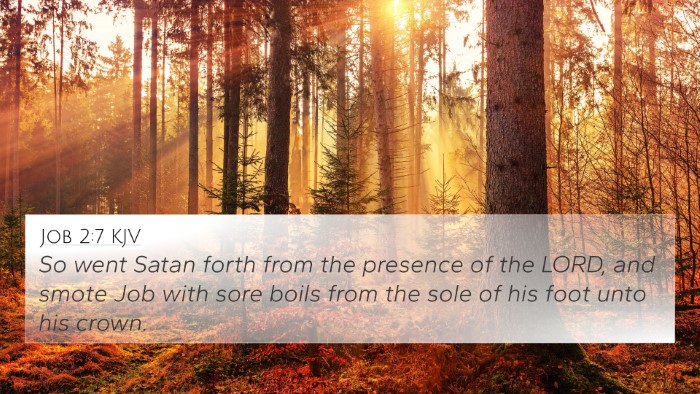Understanding Job 30:18
Job 30:18 states: "By the great force of my disease is my garment changed: it bindeth me about as the collar of my coat." This verse reveals Job's deep anguish and sense of oppression, emphasizing how his physical suffering has a profound psychological and emotional impact.
Contextual Analysis
In the context of the Book of Job, this verse appears as Job laments the depth of his affliction. Job had once enjoyed prosperity and respect, but his suffering grotesquely altered his life circumstances. This passage illustrates the stark contrast between his past and present, as he is now constrained both physically and emotionally.
Insights from Public Domain Commentaries
-
Matthew Henry: Matthew Henry interprets this verse as Job expressing how his sickness has metaphorically altered his 'garment,' which symbolizes his dignity and honor. He emphasizes that the weight of Job's affliction has caused him to feel like he is bound, similarly to being constrained by tight clothing.
-
Albert Barnes: Barnes highlights that Job's garment symbolizes the covering of his body and reputation, which has been drastically changed due to his illness. He draws attention to the concept of how loss of health can lead to a loss of social standing, leading to a sense of shaming and isolation.
-
Adam Clarke: Clarke notes that Job’s mention of the collar binds him about is a potent image of how his suffering is suffocating. He correlates this image with how trials can grip an individual, causing one to feel trapped in their affliction with no way to escape.
Biblical Themes and Cross-References
This verse relates to several overarching biblical themes of suffering, isolation, and the transformation of personal identity through trials. It also connects with other Scripture passages that echo similar sentiments:
- Psalms 38:4: "For mine iniquities are gone over my head: as an heavy burden they are too heavy for me." - This emphasizes the weight of affliction similar to the burden Job feels.
- Psalms 69:20: "Reproach hath broken my heart; and I am full of heaviness: and I looked for some to take pity, but there was none..." - Reflects the emotional toll of suffering.
- Isaiah 53:3: "He is despised and rejected of men; a man of sorrows, and acquainted with grief." - This verse embodies how physical and emotional suffering often lead to social rejection.
- 2 Corinthians 12:10: "Therefore I take pleasure in infirmities, in reproaches, in necessities, in persecutions, in distresses for Christ's sake..." - Paul embraces suffering as a means to demonstrate strength.
- Hebrews 12:1: "Wherefore seeing we also are compassed about with so great a cloud of witnesses, let us lay aside every weight..." - Encouragement to bear burdens, resonating with Job’s experience.
- Job 7:19: "Thou watchest me now, and dost not thou see me?..." - Highlights Job's feeling of being overwhelmed and under constant scrutiny in his suffering.
- James 5:11: "Behold, we count them happy which endure. Ye have heard of the patience of Job..." - A direct connection to Job's endurance amidst suffering.
Theme Connections
Thematic connections in this verse arise around the ideas of suffering and identity transformation. Job's struggles also lead readers to explore how these themes are depicted throughout the entirety of Scripture.
Cross-Referencing Insights
For a deeper understanding of Job 30:18, one can use tools such as a Bible concordance or a cross-reference Bible study guide. These resources can assist in identifying connections between various Bible verses, enhancing one's understanding of how different passages inform one another.
Conclusion
Job 30:18 speaks to the profound pain and transformation that suffering can induce in an individual. By reflecting on this verse through the lens of both personal experience and biblical cross-references, one gains insight into the broader narrative of suffering in the Scriptures and the potential for resilience that emerges even in times of despair.







